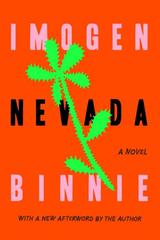 Imogen Binnie ruminates on the far-reaching impact of her 2013 novel, Nevada (MCD/FSG), in the afterword to the 2022 reprint. A decade after it was first published, the story of how New York City indie bookseller Maria winds up in a Star City, Nev., Wal-Mart has been heralded as "ground zero for modern trans literature" and one of the "great American road-trip" novels. Binnie, though, is skeptical of such accolades, humbly responding, "I don't really feel like a genius visionary who invented literature centering marginalized experiences." She then proceeds to identify the writers and communities that laid the groundwork for her to write Nevada. In some ways, her review of early trans literature reads as a historical survey of early Internet networking, before social media platforms, because it's true that works of this nature were difficult to come by in print. It's a jolt to remember that expansive lives were lived online before Facebook changed the landscape, even for those of us who were around to experience it.
Imogen Binnie ruminates on the far-reaching impact of her 2013 novel, Nevada (MCD/FSG), in the afterword to the 2022 reprint. A decade after it was first published, the story of how New York City indie bookseller Maria winds up in a Star City, Nev., Wal-Mart has been heralded as "ground zero for modern trans literature" and one of the "great American road-trip" novels. Binnie, though, is skeptical of such accolades, humbly responding, "I don't really feel like a genius visionary who invented literature centering marginalized experiences." She then proceeds to identify the writers and communities that laid the groundwork for her to write Nevada. In some ways, her review of early trans literature reads as a historical survey of early Internet networking, before social media platforms, because it's true that works of this nature were difficult to come by in print. It's a jolt to remember that expansive lives were lived online before Facebook changed the landscape, even for those of us who were around to experience it.
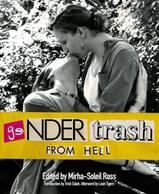 And prior to that, there were zines: scrappy, photocopied, and galvanizing. Back in the '90s, Canadians Mirha-Soleil Ross and Xanthra Phillippa MacKay published reams of interviews, collages, reportage, obituaries, and editorials dedicated to the authentic and dynamic lived experiences of trans people. Like snapshots from a disposable camera, zines aren't typically recognized for their longevity, and yet Ross has preserved and gathered this archive into the compendium Gendertrash from Hell (LittlePuss Press). Each page is a facsimile of the publication's original layout presented as a time capsule from an era not all that long ago, an unretouched gift for future generations.
And prior to that, there were zines: scrappy, photocopied, and galvanizing. Back in the '90s, Canadians Mirha-Soleil Ross and Xanthra Phillippa MacKay published reams of interviews, collages, reportage, obituaries, and editorials dedicated to the authentic and dynamic lived experiences of trans people. Like snapshots from a disposable camera, zines aren't typically recognized for their longevity, and yet Ross has preserved and gathered this archive into the compendium Gendertrash from Hell (LittlePuss Press). Each page is a facsimile of the publication's original layout presented as a time capsule from an era not all that long ago, an unretouched gift for future generations.
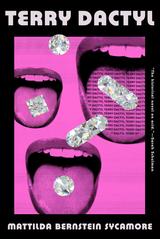 Further transcending the passage of time is the eponymous main character of Mattilda Bernstein Sycamore's spectacular new novel, Terry Dactyl (Coffee House Press). Raised by two mothers in Seattle, Terry witnesses firsthand the early devastation of the AIDS crisis that killed so many of her family friends. When the time comes for Terry to pursue a college education, she moves to New York City, only for studies to take a backseat to drugs, Michael Alig parties, and the dazzling love of a fellow club kid called Sid. But Terry Dactyl explodes any Party Monster comparisons by suddenly shifting the narrative scope years into the future, when another epidemic, Covid-19, spurs Terry's return to Seattle.
Further transcending the passage of time is the eponymous main character of Mattilda Bernstein Sycamore's spectacular new novel, Terry Dactyl (Coffee House Press). Raised by two mothers in Seattle, Terry witnesses firsthand the early devastation of the AIDS crisis that killed so many of her family friends. When the time comes for Terry to pursue a college education, she moves to New York City, only for studies to take a backseat to drugs, Michael Alig parties, and the dazzling love of a fellow club kid called Sid. But Terry Dactyl explodes any Party Monster comparisons by suddenly shifting the narrative scope years into the future, when another epidemic, Covid-19, spurs Terry's return to Seattle.
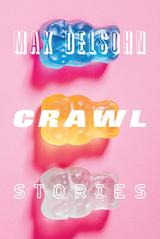 Meanwhile, it's in the Seattle of the 2010s where Max Delsohn finds his muse for the stories in Crawl (Graywolf). Each one is a frisky, self-aware study of trans masculine formation, whether the narrators are navigating awkward social dynamics among friends or cruising the dark hallways of a gay bathhouse. Drama is often the name of the game, with "Don't Be Boring" standing out as an exquisite rendering of the treacherous line between playfulness and cruelty. All the hurt feelings notwithstanding, Delsohn's stories hardly ever hinge on extreme danger, subtly testifying to slow but sure progress afforded to queer lives in that decade.
Meanwhile, it's in the Seattle of the 2010s where Max Delsohn finds his muse for the stories in Crawl (Graywolf). Each one is a frisky, self-aware study of trans masculine formation, whether the narrators are navigating awkward social dynamics among friends or cruising the dark hallways of a gay bathhouse. Drama is often the name of the game, with "Don't Be Boring" standing out as an exquisite rendering of the treacherous line between playfulness and cruelty. All the hurt feelings notwithstanding, Delsohn's stories hardly ever hinge on extreme danger, subtly testifying to slow but sure progress afforded to queer lives in that decade.
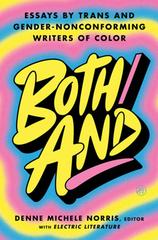 Nonetheless, there is still plenty of work to be done, and the chorus of voices anthologized in Both/And: Essays by Trans and Gender-Nonconforming Writers of Color (HarperOne) brainstorm the possibilities for a better future in what our reviewer describes as "a joyful call to action." Edited by Electric Literature's Denne Michele Norris, this collection runs the gamut of salient topics, including austere standards of beauty, risks of assault and suicide, and historical precedent for gender variation. These authors, artists, and activists continue the work done for generations, even before Gendertrash from Hell first fell hot from the copy machine, to imagine better outcomes for futures both personal and political.
Nonetheless, there is still plenty of work to be done, and the chorus of voices anthologized in Both/And: Essays by Trans and Gender-Nonconforming Writers of Color (HarperOne) brainstorm the possibilities for a better future in what our reviewer describes as "a joyful call to action." Edited by Electric Literature's Denne Michele Norris, this collection runs the gamut of salient topics, including austere standards of beauty, risks of assault and suicide, and historical precedent for gender variation. These authors, artists, and activists continue the work done for generations, even before Gendertrash from Hell first fell hot from the copy machine, to imagine better outcomes for futures both personal and political.
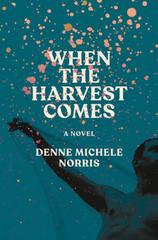 Norris is the first Black, openly trans woman to helm a major literary publication, and in her debut novel, When the Harvest Comes (Random House), she writes luxurious sentences about a viola player entering a marriage. Because of the instrument's design, "You just had to find the one that fit your body." The musician's life is far from without struggle, but in this irresistibly lush slow burn of a novel, the joy, the music--of finding that alignment between soul and body--takes flight and soars. --Dave Wheeler, senior editor, Shelf Awareness
Norris is the first Black, openly trans woman to helm a major literary publication, and in her debut novel, When the Harvest Comes (Random House), she writes luxurious sentences about a viola player entering a marriage. Because of the instrument's design, "You just had to find the one that fit your body." The musician's life is far from without struggle, but in this irresistibly lush slow burn of a novel, the joy, the music--of finding that alignment between soul and body--takes flight and soars. --Dave Wheeler, senior editor, Shelf Awareness

